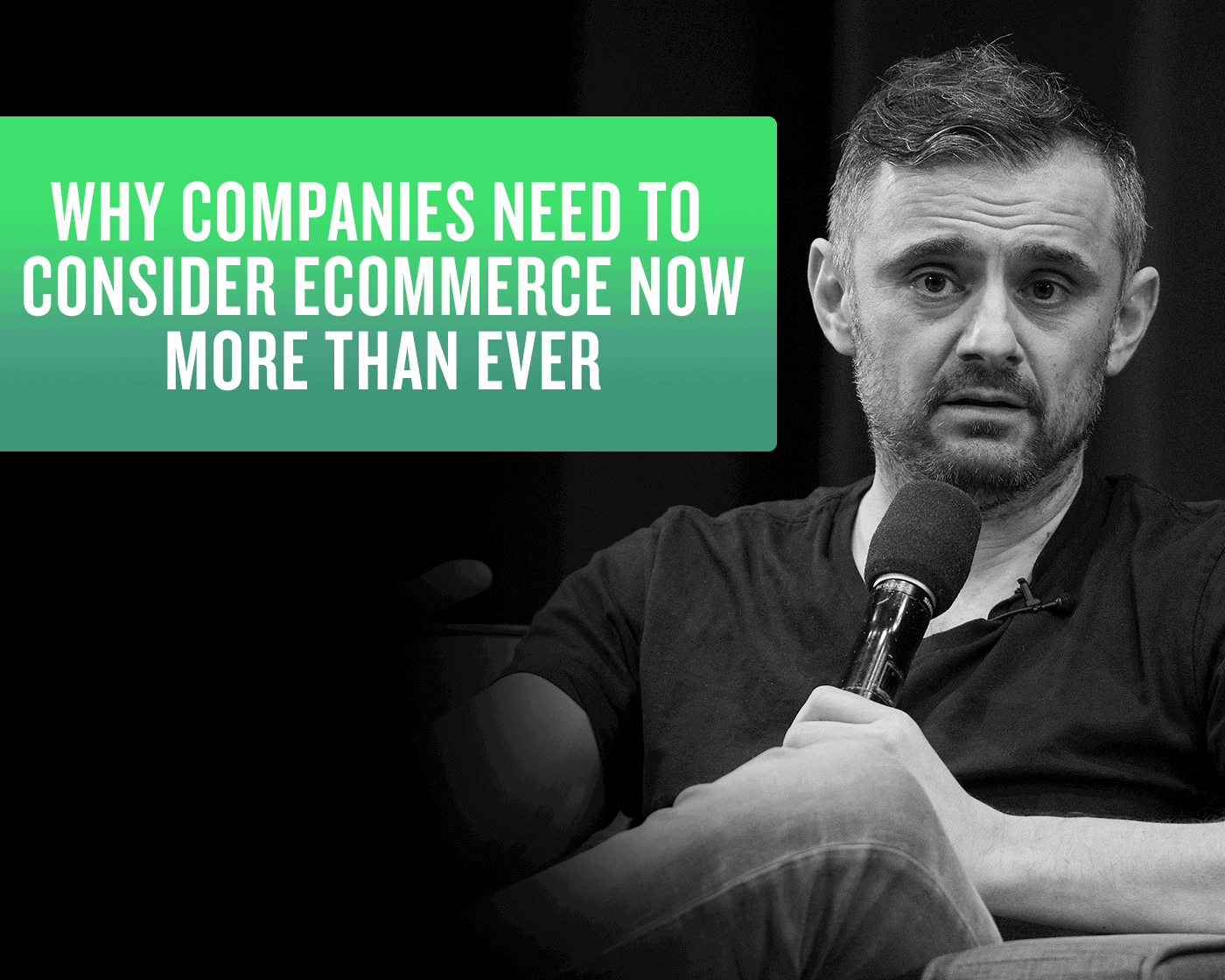In the current environment with how coronavirus is impacting large and small businesses, putting a focus on e-commerce is absolutely essential.
I’ve been in the e-commerce world since 1996 (when Wine Library launched an online store) so I’m a huge believer.
But at this point, the cat’s out of the bag. I just can’t imagine anybody not recognizing the need for an e-commerce presence in 2020. This is a tragic event on so many levels that’s happening right now, but if it wakes up a business that would have been inevitably put out of business by not taking this seriously, then I hope that the decision maker understands what’s happening here.
I hope more businesses have finally figured out how it is literally essential if you want to sell something in today’s world.
Here’s my two cents on how the current pandemic is affecting the e-commerce world, and what retailers and businesses need to consider as they transition.
The short term vs long term impact on e-commerce
In the short term, the numbers have exploded for most companies that sell essentials, for sure. Not all e-commerce companies are the same obviously, but most people who are in a consumption-type business (i.e. grocery stores, super markets, etc) have seen their numbers skyrocket.
I think the long-term impact on the industry centers around people changing their buying behaviors. That’s what could potentially create a shift. For example, a lot of people who wouldn’t otherwise buy their groceries online are now starting to get them delivered.
People who wouldn’t otherwise get basic items and cleaning supplies delivered to them are now starting to consider that option. According to Rakuten Intelligence, order volume for online grocery retailers surged 210% from March 12th – 15th of 2020, compared to the same dates a year ago.
There are some e-commerce companies that unfortunately won’t survive this time for a variety of reasons (i.e. the kinds of products they’re selling, the category they’re in, or a number of other factors) so it’s not one-size-fits-all.
But in 2019, e-commerce share of total retail sales was around 14% – I think we’re going to see that grow given how we’re seeing online purchase behavior speed up. People who might not have been as comfortable ordering things online are now getting into the market.
Companies like Amazon and Walmart are of course going to win big from this – data shows that Walmart is winning over half of all new online grocery shoppers. But when you have giant winners like Amazon and Walmart, there are inevitably going to be other winners too. For example, people said there couldn’t be another “eBay” till StockX emerged as an auction site.
We may see more brands selling all their products on their own site vs Amazon because the current landscape allows them to do so.
The other shift that I think could happen is the realization that diversifying supply is super important. Depending on where a company’s product supply is coming from and where it’s sourced, there could be more issues at play when it comes to fulfilling orders in this time. One of the other long term insights I hope businesses will take away from this is to not be one dimensional when it comes to that source.
Leverage content to build an e-commerce business
[bctt tweet=”No matter what you do — no matter what industry you’re in, no matter what product you sell, you are in the media business.”]That quote is how I think companies need to start thinking in order to grow a business online in 2020.
It’s the mindset behind a wine business starting a wine reviews show, a lawyer starting a content machine around golf, or the Michelin tire company starting the Michelin guide. It’s about putting out content not necessarily about your specific niche, but content that would interest the people that you’re trying to court.
It could be a content series reviewing the best products in your space that gets distributed across social in audio, video, pictures, and written form. It could be a content series storytelling around how you make your products or how you got started.

The best way to compete with other businesses that are massive and can throw money against things like Google ads is by becoming a content authority in your space in some capacity. It’s why I started Wine Library TV – I “became” a media company in the wine space.
The ideas and strategies around this might depend on what industry you’re in, what your brand is, and what you’re comfortable with, but starting the process of building content pillars in your world is a key strategy for any business building out an ecommerce presence.












https://fastpillsformen.com/# Viagra without a doctor prescription Canada
Stay tuned! More products will be shown here as they are added. This anti-aging pure retinol face and neck serum leaves skin feeling smoother, hydrated, and renewed. As a result, the look of lines, wrinkles and premature sun damage is reduced. La Roche-Posay Retinol B3 Serum 30ml There are no reviews yet. La Roche-Posay Hyalu B5 Repair Serum Antirrugas 30ml 1.01 fl.oz La Roche-Posay Hyalu B5 is an anti-aging serum for all skin types. It contains a powerful repairing and moisturizing action. In… Vichy Laboratoires *Average star rating within the product image is based on a Review Crew panel of 100 and is correct as of 02 10 2020. Every skin type has its own specific needs. Select your concern and get the dermatological advice and skincare solutions you need. La Roche-Posay has designed a new generation of products based on thermal waters to guarantee its customers the possibility of applying the right treatment for the face and body every day. For over 30 years, the brand’s mission has been to guarantee well-being to all skin types, especially the most sensitive.
https://front-wiki.win/index.php?title=Big_makeup_box_with_makeup
Eyelash growth serums, a cosmetic item for eyelashes, claim to lengthen, thicken natural lashes, and rejuvenate the hair follicles along the lash line. So, are you now prepared to receive your ideal lashes? Good! Here are 35 eyelash serums that beauty experts recommend you to try: Why use fake lashes when you can naturally grow your own lashes? But whether or not over-the-counter eyelash serums “work” for hair growth, the answer would be no—or at best, maybe. According to Dr. Gohara, most eyelash serums will condition and support the keratin in your lashes, kind of like a conditioner. “Lash conditioners may help strengthen lashes, prevent them from breaking, or lightly swell them so they look a little thicker,” says ophthalmologist Ilyse Haberman, MD.
Cheap generic Viagra online Generic Viagra for sale Viagra tablet online
https://fastpillseasy.com/# cheap ed drugs
best ed pills online: cheap cialis – how to get ed pills
https://maxpillsformen.com/# Generic Cialis without a doctor prescription
buy Viagra over the counter: Sildenafil 100mg price – Buy Viagra online cheap
http://fastpillseasy.com/# ed meds on line
erection pills online online ed medication cheapest erectile dysfunction pills
Cialis 20mg price in USA: MaxPillsForMen.com – Generic Cialis price
https://maxpillsformen.com/# buy cialis pill
Buy Tadalafil 20mg Generic Cialis without a doctor prescription Buy Tadalafil 20mg
https://fastpillseasy.com/# ed meds cheap
Cialis 20mg price Max Pills For Men Cialis 20mg price in USA
Viagra tablet online: FastPillsForMen.com – viagra canada
https://fastpillseasy.com/# erection pills online
Cheap Viagra 100mg FastPillsForMen.com Viagra Tablet price
https://sweetbonanza25.com/# sweet bonanza demo oyna
yeni deneme bonusu veren siteler deneme bonusu veren siteler yeni yeni deneme bonusu veren siteler
slot casino siteleri: guvenilir slot siteleri – slot casino siteleri
https://casinositeleri25.com/# Deneme Bonusu Veren Siteler
https://casinositeleri25.com/# en guvenilir casino siteleri
casino bahis siteleri casino bahis siteleri canl? casino siteleri
Canl? Casino Siteleri: deneme bonusu veren casino siteleri – guvenilir casino siteleri
https://casinositeleri25.com/# deneme bonusu veren casino siteleri
sweet bonanza guncel sweet bonanza oyna sweet bonanza guncel
Casino Siteleri: canl? casino siteleri – guvenilir bahis siteleri
Deneme Bonusu Veren Siteler casino bahis siteleri Canl? Casino Siteleri
Application development is the process of creating software designed to perform specific tasks or provide specific services to users. Applications can be mobile, web, or desktop, and can cover a wide range of functionality from social networks to business tools. It is important not only to create a functional application, but also to ensure its stable operation, security, and an attractive and user-friendly interface for end users.
Rbviet.net Rbesports – Nền tảng cá cược esports hàng đầu với giao dịch siêu tốc, bảo mật an toàn tuyệt đối và nhiều ưu đãi độc quyền dành cho fan thể thao điện tử. – 2025 March 28, 14:49
Rayesports.com Rayesports mang đến trải nghiệm cá cược esports hoàn hảo với kèo cược đa dạng, giao dịch tức thì, bảo mật tối ưu và hỗ trợ mọi lúc mọi nơi. – 2025 April 04, 10:00
gacha168
Tham gia ngay Rbviet.net Rbviet để tận hưởng cá cược esports chuyên nghiệp, với hệ thống bảo mật hàng đầu, giao dịch siêu tốc và hàng loạt ưu đãi dành riêng cho bạn. – 2025 April 11, 09:54
Профессиональный сервисный центр по ремонту бытовой техники с выездом на дом.
Мы предлагаем:сервис центры бытовой техники москва
Наши мастера оперативно устранят неисправности вашего устройства в сервисе или с выездом на дом!
Профессиональный сервисный центр по ремонту бытовой техники с выездом на дом.
Мы предлагаем:сервис центры бытовой техники москва
Наши мастера оперативно устранят неисправности вашего устройства в сервисе или с выездом на дом!